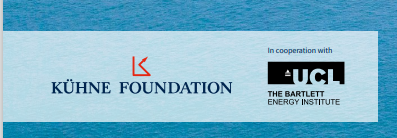
USD 48 billion at risk of being written off as gas tanker orders soar by 300% in five years, new research shows
LONDON/HAMBURG: USD 48 billion invested in LNG carriers could be written off by 2035 as they will be in oversupply in a 1.5°C climate scenario with declining fossil energy use, according to new research from UCL Energy Institute and Kuehne Climate Center (KCC). The findings point to a growing stranded asset risk for investors and shipowners as demand projections for LNG transport across a broad range of decarbonisation pathways for the world economy diverge sharply from the industry’s rapid fleet expansion. Even in energy scenarios with a high fossil fuel consumption that would lead to a disastrous 4°C of global warming, the LNG fleet remains in oversupply over the next decade.
Dr Vishnu Prakash, Managing Director of Alethiarc, who led the work said, “The tool and our analysis identify and unlock ways to understand climate-related risks that is often overlooked, and, importantly, shows how shipping assets are likely to face significant financial risk from the global energy transition even under more modest climate change scenarios.”
Besides LNG tankers, the research also covers oil tankers and LPG tankers which show a lower risk profile, not least to their better ability to switch to other cargoes. Dr Marie Fricaudet, Senior Research Fellow at UCL Energy Institute said:“For the first time, when estimating of the overall fleet value at risk, we have included the possibility for certain ship types to be repurposed to carry alternative cargoes. This allows the users to measure the advantage of cargo optionality when it comes to stranded assets.”
The research is publicly available in the ‘Investment Risk Monitor for Fossil Fuel Carrying Ships’ tool developed by the UCL and KCC. This new interactive online tool provides high-level fleet-wide estimates of the future overall supply and demand balance for maritime transport services of different fossil fuel carrying ship types under different climate and energy scenarios.
Maarten Biermans, Partner at Prow Capital said: “Anyone active or contemplating becoming active in the financing of these types of vessels is well advised to study and use this tool to the max. It will help financiers to map and avoid stranded assets while also improving their conversation with regulators.”
The tool also provides insights to where the financial risk is concentrated. 75% of the whole fleet of fossil fuel carrying vessels sits on corporate balance sheets in the top 10 ship-owning countries, with Japan, South Korea, Greece, and P.R. China potentially among the most exposed. Not only do companies based in the United States have a high risk from fleet ownership, the New York Stock Exchange is the largest trading place for companies that own fossil fuel carrying ships, covering about 12.5% or USD 42 billion of the total current estimated value of the existing fossil fuel carrying fleet.
Stefanie Sohm from Kuehne Climate Center: “The shipping sector has a profound transformation ahead of itself. With the Investment Risk Monitor we want to give owners and investors access to information that can help them making good decisions for their current and future investments.”
While demand for the transport of other fossil fuel cargoes like coal, crude oil, oil products or LPG are equally set to decline towards a climate-compatible future, natural vessel retirement and options to switch to other cargoes keeps these fleets at a lower risk. In contrast, the young fleet of LNG carriers has a very high newbuild value and a purpose-specific design; repurposing to other commodities, if at all possible, would require high additional investments, reducing the fleet’s competitiveness and ability to generate profit.
The tool will be showcased at New York Climate Week in a session co-organized by the Korean-based organization Solutions for Our Climate (SFOC). Rachel Eunbi Shin from SFOC said “The Investment Risk Monitor provides important data. Korea dominates over 70% of the global LNG shipbuilding market with significant public funding support. With LNG shipping freight falling below break-even levels, we’ve been working with policymakers to help them factor in these risks when making investment decisions.”
The tool and the related briefing is available at www.shipping-transition.org.

